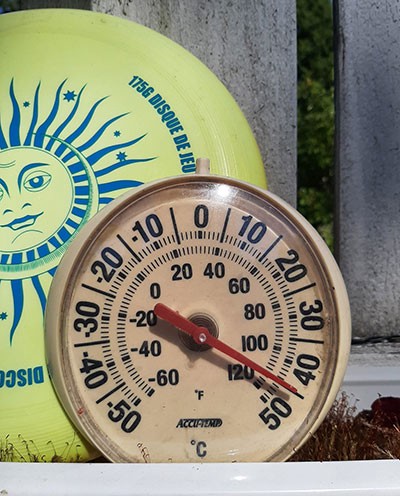The Pain of Parenting Through the Climate Crisis
From heat domes to polar vortexes, the last year made the climate crisis heartbreakingly real in BC.
We imagine there is always more time — until there isn’t.
Almost everything changes by inches, so slowly that you don’t realize it’s happening. When children are little, we cannot quite fathom that they won’t always be small enough for us to protect. The Earth, too, shifts in slow arcs of evolution, its shape worn down by wind and water, its cycles and seasons unchanged for millennia. We imagine there is always more time to prepare for change and alter course — until suddenly there isn’t.
Last summer, BC experienced a record-breaking and fatal heat wave; in the months that followed, additional extreme weather events rocked the province. The message of the last year is clear: the window to prepare or alter course has passed. But there seems no greater urgency today — among the public or in government — than there was last year.
As the world we leave our children changes no longer by inches but by great awful leaps, we will be forced to take stock of this horrifying inheritance we’ve left behind. By our inaction, by our indifference to urgent warnings, by our belief that change comes slowly and that there is always more time to intervene, even when it is clear: there is no more time at all.
My little brother spots the frog first and calls us over to look, pointing in excitement. A frog? A frog! We all come running. Frogs, we are convinced, would make the best pets — that is, if we can ever catch one. No matter how slow, how careful, how quiet we are, they always manage to hop away, our hands closing on empty air in the spot where they’d just been, grass rustling in their wake.
But this frog is different. He is stuck inside the window well, a semi-circle of corrugated tin about two feet deep carving out space around the basement window. It’s too deep for him to escape on his own. We kneel alongside my brother, the mid-summer Ontario sun hot on our little heads. His chubby toddler finger points. “Look,” he whispers. “Catch?”
The heat is oppressive. It is impossible to take a full breath, impossible to move at a normal pace.
As the oldest kid, this is my job. I reach wide, careful to avoid the tin — the metal gets so hot in the summer sun that it will burn my skin if I brush against it. I close my fingers in slow-motion around the frog’s body, waiting for him to wriggle and jump.
But he is dry and weightless in my hand, an empty shell, hollow and unmoving. Dead. I drop his little body and it flutters across the rocks like an autumn leaf. I jerk back in surprise; the hot tin of the window well burns the underside of my arm, and I jerk again from the pain, falling backwards onto the grass.
The weather app on my phone tells me it’s 39°C, but the large outdoor thermostat hanging next to my door shows 41°, and it’s not quite 11 am. If I stay out here too long (that is, more than three minutes) I start to feel drunk — dizzy, lightheaded, nauseous. Everything feels bleached out and paper-thin: the grass under my toes, the leaves on the trees, the dirt in the garden. The heat is oppressive, a physical weight on my body. It is impossible to take a full breath, impossible to move at a normal pace. Every task feels impossible: cooking, chores, sleeping, thinking. I press my hand to my children’s foreheads a hundred times a day to make sure they’re still hydrated enough to sweat.
This is the tail-end of June 2021, and we are midway through a six-day heat wave that is going to get much, much worse before it gets better. It’s not really a heat wave at all, which would be uncommon, but not unheard of, here in Surrey, BC, on the west coast of Canada.

The thermometer hits 45°C.
No, this is a heat dome, a weather term most of us have never heard before this week. Heat builds up under a high-pressure “lid” and can’t escape, even at night when temperatures should drop. Each day is disastrously warmer than the last.
Before it eases, a total of 619 people will die throughout the province; a BC Coroners Service report issued nearly a year later will identify that most are elderly, living alone, and often in poverty, without means to cool off. Ambulance and emergency services will be so overwhelmed that people will wait hours for help after calling 911, adding to the deaths. Crops will shrivel up. A whole town will burn down, dried out like tinder after days on end under some of the hottest temperatures on record in the country.
I try not to think about how bad it is, what it means, as I put the kids to bed with fans running and bottles of water nearby. But after years of “canary in the coal mine” warnings on climate change, I know that this is now a legion of canaries: a screeching, terrifying, deadly symphony, and they’re all on my doorstep.
They say this is a once-in-a-millennium occurrence. But it takes less than half a year for us to be rocked by more extreme weather. In November, BC is swamped by torrential rainfall caused by an “atmospheric river” — a weather phenomenon in which a massive corridor of warm moisture-heavy air is carried inland from the Pacific Ocean — leading to flash floods that wipe out bridges, highways, homes, towns. Countless livestock drown on flooded farms. Several people lose their lives, their cars swallowed up in washouts and mudslides.
A month later, we’re hit again: a polar vortex brings frigid air from the North Pole, driving overnight temperatures to -15°C near the coast, worse inland, and doubly frigid with the wind chill. I’ve experienced colder weather in my childhood in Ontario and Alberta, and during winter visits to the Maritimes to see my sister. But this is different. With its typically temperate climate, our region’s systems aren’t designed for this — we have limited city equipment to deal with ice or snow, not enough hydro crews to manage frozen wires. Many people don’t even own snow boots let alone snow tires, and I don’t know a single person with a block heater on their car.
I press my hand to my children’s foreheads a hundred times a day to make sure they’re still hydrated enough to sweat.
Our houses aren’t built for these extremes either. Certainly, my 80-year-old house isn’t. In a normal year it’s only a problem on a handful of days. But after living through a 60-degree change in temperature over a span of six months, from 40-plus in summer to -15 in winter, the notion of a “normal year” seems quaint at best, and foolhardy at worst.
During the heat dome, we ran a pair of aging window air conditioners all day and night for weeks (a luxury many people didn’t have at all) and the interior of the house still ran into the low 30s. During the vortex, our furnace was hard pressed to keep up at times, and we pulled out rarely used electric blankets. In both instances, we were ready to decamp to the homes of my siblings if necessary, where newer construction and ventilation systems kept things not just tolerable but borderline normal. Most things in life are manageable with the right tools and enough money to purchase them — even, it seems, a climate crisis.
Shortly after the new year, my husband and I start talking about ways we can change the house, within our means, to make it better. Not “granite countertops and fancy appliances” better, but “ready to withstand whatever weather may be coming our way in the future” better. In the middle of a discussion about potential cooling systems, I break down, crying so hard I can barely catch my breath.
“What were we thinking?” I ask between sobs. “What were we thinking?”
My pragmatic partner assumes I am talking about the house, this ancient imperfect too-small home that has kept us safely and gratefully housed in a region known for its ongoing housing crisis.
“It’s fine. It’s great. We can figure this out,” he says. “I’m adding a new fan in the attic, OK?”
He knows the fact he can fix and build and wire without help from contractors will ease my stress about what we can or can’t afford. But I shake my head, stare at my hands in my lap. It’s not the money, or the house, or anything we can repair or renovate.
“I mean the kids. To bring them into… all this. What were we thinking?”
I’m in part responsible for a world no longer stable enough for my children to inherit in safety. We all are.
I’m not the first to wonder about the wisdom of having had children in a world that caught fire faster than we expected — or sooner than we wanted to believe, at any rate. I’ve written about it before. I’ve laid awake nights pondering it. The question was always pressing and ever-present but still, in most ways, vague: Climate change was out there somewhere. Climate change did not feel like it was in southwestern BC, where the transition from one season to another is a mild shift of rainfall averages.
But when I kissed my children’s sweaty sleeping foreheads in the middle of the heat dome, the question was on my lips. And when I broke down over a conversation about cooling pumps, about the privilege to even have such a conversation, it was impossible to ignore. It’s a question without an answer, really. I have to wrestle with the grief that I am in part responsible for the world that is no longer stable enough for them to inherit in safety. We all are.
There’s a series of trails through a ravine near my house, which permits me the illusion of being in some far-flung forest, miles from the city. In February, during a walk on a misty-grey day, I hear the distinctive croak of a frog. It takes me by surprise and I pause, standing still to listen for it again. It’s somewhere to my left, in a jumble of fallen logs, decomposed leaves, and pockets of rainwater.
He croaks again, and then again. Is this the right time of year for a frog to be awake? Isn’t it too early, not warm enough? I have a sudden urge to find him, catch him up in my hands and carry him home. Frogs would make the very best pets, after all — if you could catch one. I am hit with the visceral ghost-memory of a dried-out husk of a frog in my hand.
How he must have suffered, trapped there for days without water in the hot summer sun. If only we’d found him sooner, I think, the echo of childish grief. Surely we’d have saved him, if we’d known what was coming, rescued him if we’d just realized in time. Maybe. I hope so. But it seems it is easy to believe there’s still time to play, even when it is clear: there is no more time at all.
Print Issue: Summer/Fall 2022
Print Title: What Were We Thinking?
